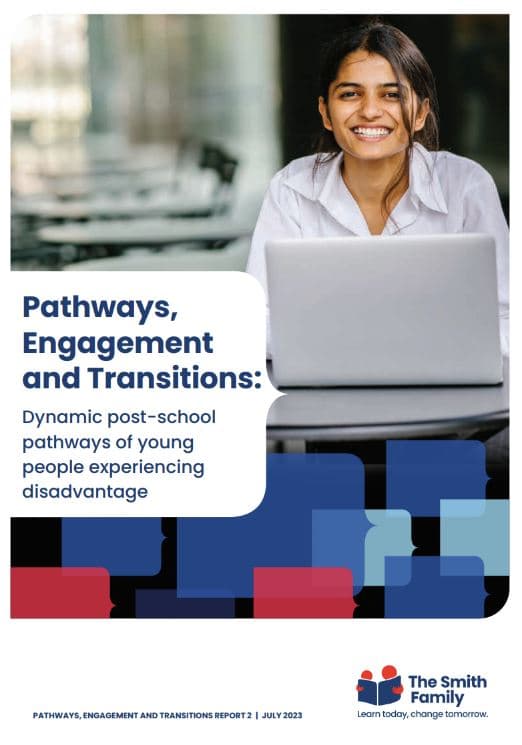
Pathways, Engagement and Transitions: Most young people experiencing disadvantage engaged in post-school work or study, but concerns remain for future careers
A longitudinal study on the post-school transitions of young people experiencing disadvantage has found that while the vast majority are engaged in work or study two years after finishing school, they are missing out on career progression opportunities which could have long-term consequences for their futures.
The latest results of the longitudinal Pathways, Engagements and Transitions (PET) research project conducted by The Smith Family, show that 85% of young people were engaged in study or work in their second year after finishing high school. A further 11% were looking for work or volunteering. However, despite this high level of engagement, it also reveals many of the young people are in precarious employment and need additional support to progress their careers.
Participation in work and study post-school
The PET research is exploring the different work and study pathways young people experiencing disadvantage take after they leave school, with over 1,000 young people who were in Year 12 in 2020 taking part in a survey in both 2021 and 2022. Thirty-three young people also took part in in-depth interviews.

KEY FINDINGS
- 85% were in work and/or post-school study in 2022.
- 57% were fully engaged in work and/or study (over 35 hours or more a week) in 2022, up from 54% in 2021.
- 28% were partially engaged in study or work (less than 35 hours a week) in 2022, up from 23% in 2021.
- In 2022, a further 11% were looking for work or volunteering, with only 3% of young people not engaged in work, study, looking for work or volunteering.
- In 2022, 70% of young people were working, up from 55% in 2021 and 48% were studying in 2022, down from 52% in 2021.

Factors supporting post-school engagement and successful transitions
The PET study highlights that a number of factors interact to positively influence the post-school transitions of young people experiencing disadvantage.
- Young people’s career management skills are essential to making strong and informed transitions into post-school work or study. This includes their personal management skills, learning and work exploration skills and career building skills.
- Strong supportive adult social networks created, initiated or highlighted various career development opportunities for some young people. These networks included family and extended family members, friends, co-workers and managers, and educational staff and placement supervisors.
“My co-workers are wonderful … they’re very supportive. They’re always helping me … if it’s something that feel s… overwhelming … something I haven’t been used to or done before, they help me … My manager … she’s a new source of support – the person I could go to for advice and help aside from my family or friends.” Farah
“One of my dad’s friends was in the business … and … I met people through him … and they gave me the idea … So I got myself enrolled … and joined the course with them … I met a lot of other people … who were in the same situation as me … Through the course I got a job, and got my communication skills … I managed to talk and lose some of that shyness … that … helped in subsequent interviews … and for the job I have now.” Sahil
- Career related part-time employment, course placements, paid cadetships or internships provided many young people with opportunities to explore their chosen pathways and further investigate the extent to which these pathways matched their interests, skills, and abilities. Paid cadetships or internships were key to enabling some young people to participate in further education and were seen as key opportunities to acquire skills and provide exposure to potential employers.
“The best thing this year was definitely the internship … It was one of The Smith Family programs … Seeing what goes on in a major company … has given me a lot of insight into the industry and I met other interns who are completing or have already finished their degrees … There were like 35 other interns … It’s really interesting to hear their perspectives … We’re all put in different areas, so I can hear what they’re doing and compare it to what I’m doing … and see what I want to do … There was also the other Smith Family interns who were working in different companies … who I could chat to about their experiences … I definitely have a strong focus on my studies after my internship.” Eliza
- Academic support systems and programs provided some young people with the means of engaging and succeeding in their studies.
“The drop-in sessions were pretty helpful. The university would dedicate some time, it’d be a live class where the lecturer is there for us and we can ask questions, get the help we need. It does help.” Rabia
- Post-school opportunities to explore apprenticeships and higher education opportunities supported some young people to increase their engagement in work or study.
Barriers to successful transitions
Not all young people in the PET study were on strong career pathways and young people identified a range of barriers to their engagement in work or study.
- The significant disruptions caused by the COVID-19 pandemic were still impacting young people in 2022. The shift to online learning during the pandemic had discouraged some from further study, job losses or reduced hours continued to disrupt employment experiences, and some young people had been unable to complete Vocational Education and Training (VET) qualifications.
- Precarious and limited employment opportunities remained a feature of many youth labour markets.
“The apprenticeship was promised to start … and then the day I’ve quit my casual job in a supermarket, the apprenticeship workplace said ‘we no longer need you’ … I got that over email, not even a call, not even told in person … I did email them back and they just never gave me an answer. So, I was jobless for a month.” Braden
- Financial constraints, including those associated with costs of living forced some young people to choose employment over study opportunities, particularly when study options required significant hours of unpaid work placements.
“You pretty much have assignments back-to-back, and you’ve got placement as well that you’re not allowed to work during, which is two weeks, then four weeks, then six weeks. So, you’ve got to think, ‘Can I go that … long without working for an income?’.” Kim
- Poor health and mental health and inadequate, ineffective and/or expensive health care excluded some young people from the care they needed to be able to fully engage in work or study.
- Some young people have significant informal caring responsibilities that affected the extent to which they could fully engage in work or study.
“My parents have a lot of health conditions … I interpret for them … I do regular housework … I cook … This is going to be just how it is, and in the future … I’m just going to be helping them more … as they will just get worse.” Farah


What more can be done?
The PET study identified a number of opportunities to strengthen the post-school pathways of young people experiencing disadvantage including:
- Greater individualised support while at school to help more young people complete Year 12.
- Fund an expansion of high-quality career-related, remunerated work placements, cadetships and internship programs, which target young people experiencing disadvantage. These are particularly important to help overcome some of the financial constraints of completing post-school study.
- Implement intentional and high-quality career development learning throughout school and beyond, so young people can form career development skills, are exposed to a range of different career pathways, and have clear information and support on how to get there.
- Identify young people as a priority group in national and state/territory employment policies and programs, including helping those experiencing disadvantage to build meaningful career pathways.
- Strengthen young people’s access to timely and affordable health and mental health services.

About the study
This is the second PET publication and focuses on what has changed and remained constant over the first two years since leaving school, for the young people who were in Year 12 in 2020. It draws on survey responses from over 1,000 young people and interviews with 33 of them. Young people from all states and territories participated in the survey, 55 percent are female and 45 percent are male, and 15 percent are from Aboriginal and Torres Strait Islander backgrounds. Just under 30 percent live in non-metropolitan areas and over a third have a health or mental health condition.
Over three years, 2021 to 2023, the PET study is hearing directly from two cohorts of financially disadvantaged young people on these matters. These young people were in Year 10 or Year 12 in late 2020 and on The Smith Family’s long-term educational scholarship program, Learning for Life.
The study is collecting data through:
- Three surveys in 2021, 2022 and 2023 respectively
- Three annual interviews with 60 young people who completed the surveys
- Combining this new data with information collected since these young people began on Learning for Life.

